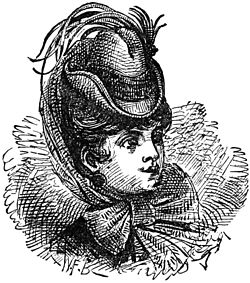places, the great blank drawing room which is a chief feature of all continental summer hotels. There they grouped themselves about, in couples and threes, and mumbled in bated voices, and looked timid and homeless and forlorn.
There was a small piano in this room, a clattery, wheezy, asthmatic thing, certainly the very worst miscarriage in the way of a piano that the world has seen. In turn, five or six dejected and homesick ladies approached it doubtingly, gave it a single inquiring thump, and retired with the lockjaw. But the boss of that instrument was to come, nevertheless; and from my own country,—from Arkansaw.
 |
| THE YOUNG BRIDE. |
She was a bran-new bride, innocent, girlish, happy in herself and her grave and worshiping stripling of a husband; she was about eighteen, just out of school, free from affectations, unconscious of that passionless multitude around her; and the very first time she smote that old wreck one recognized that it had met its destiny. Her stripling brought an armful of aged sheet music from their room,—for this bride went "heeled," as you might say,—and bent himself lovingly over and got ready to turn the pages.
The bride fetched a swoop with her fingers from one end of the keyboard to the other, just to get her bearings, as it were, and you could see the congregation set their teeth with the agony of it. Then, without any more preliminaries, she turned on all the horrors of the "Battle of Prague," that venerable shivaree, and waded chin deep in the blood of the slain. She made a fair and honorable average of two false notes in every five, but her
